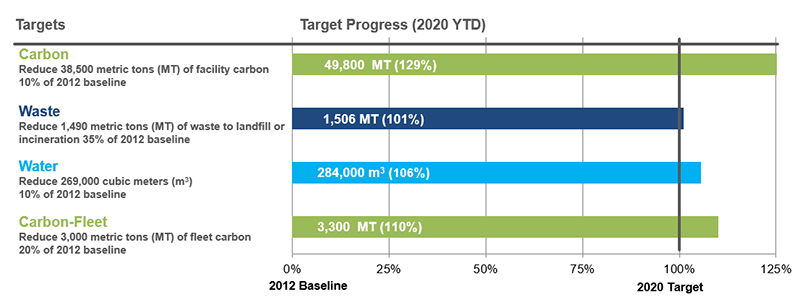

Amgen discovers, develops, manufactures and delivers life-changing human medicines that address unmet medical needs and help reduce the social and economic burden of disease in society. Our innovative medicines have reached millions of people in the fight against serious illnesses.
Our primary mission is to serve patients by developing innovative medicines for grievous illnesses. We also strive to be a responsible corporate citizen and good neighbor. We know that we must all do our part to tackle critical environmental issues, such as the effects of climate change and the depletion of natural resources.
Setting and meeting our targets: Amgen has been implementing projects and initiatives since 2008 to meet conservation targets in the areas of energy and carbon, water and waste. We’ve completed two programs since that time that have resulted in exceeding all of our targets and a 32% reduction in carbon emissions, 30% reduction in water intake, 25% reduction in waste disposed, and saved more than $200 million in operating costs.
We track the results of those projects and initiatives as progress toward the reduction targets, counting results where reduction is confirmed through a formal measurement and verification process.
Targets and Target Progress (2020 YTD)

One such innovative project: Amgen scientists pioneered a new biomanufacturing paradigm in Singapore that is leaner, greener, more flexible and productive and less costly to build and operate. At one-sixth the size of a conventional biologics manufacturing facility, this smaller plant also means a reduced impact on the environment. Compared to a large conventional facility, a next generation biomanufacturing plant cuts carbon emissions and uses less energy and water. We are currently implementing our second plant using this technology in Rhode Island.
Ensuring the quality of our data: We established a sophisticated data management system in 2010 that we use to gather and assess environmental data from Amgen’s major manufacturing, research and development, and distribution facilities representing more than 90 percent of Amgen’s operations.
Building environmental sustainability into the business of making medicines: In addition to our conservation efforts, we have integrated green practices into the core areas unique to the business of medical biotechnology, such as how we research, manufacture, and package our medicines.
Staff members power our green efforts: Our innovative and motivated staff members engage with green initiatives, such as recycling and composting, develop ideas for greater conservation, and share success across the Amgen network to advance our goals for environmental sustainability.
Green Biology, Green Chemistry: Through Amgen’s Green Biology and Green Chemistry programs, our scientists are seeking ways to make processes more efficient and to use greener compounds and fewer resources in the development of our medicines. Staff members use a guide that assesses environmental properties of raw materials, along with new technologies to minimize the use of urea and phosphates.
Our Small Molecule Process and Product Development group has made significant improvements for selected development molecules in reducing waste and enhancing process safety and robustness through green chemistry. Scientists use e-notebooks, collaboration tools, and solvent-selection guides to calculate an “e-factor” to identify the most environmentally responsible process, beginning with early research and clinical development.
Green Building Through our Sustainable Design and Construction Program: We build features into facilities or retool systems on a case-by-case basis to decrease energy and water use. We’ve adapted efficient practices to best fit our business, often going above and beyond industry green standards. This program provides guidelines to ensure not only that design, construction, and installation are environmentally friendly and efficient, but also that buildings can continue being efficient as they age.
The Road to Net Zero 2027: Amgen’s third environmental sustainability plan since 2007 includes ambitious targets on carbon emissions, water and waste reductions. A keystone of The Road to Net Zero 2027 is Amgen’s commitment to achieve carbon neutrality from its operations by 2027.
Amgen’s plan will incorporate a three-tiered approach to achieve carbon neutrality from its operations, with a primary focus on innovation through new technologies to reduce and eliminate carbon emissions from Amgen-owned operations, implementing on-site renewable energy; and where carbon emissions cannot be eliminated in our operations, we will support additional environmental and sustainability projects that sequester or avoid greenhouse gas emissions. In addition, the plan includes electrification of a percentage of our sales fleet vehicles and engaging with our partners to further reduce carbon throughout our value chain.
The Road to Net Zero 2027 also includes aggressive targets to reduce water use by 40% and waste disposal by 75%. Similar to our approach for reducing carbon emissions, the primary focus will be on implementation of innovation and efficiency projects to reduce and eliminate water usage and waste disposal.
This article has been edited for length and clarity. The opinions expressed in this article are the authors' own and do not necessarily reflect the view of their employer or the American Chemical Society.
Copyright 2022 American Chemical Society (All Rights Reserved)








